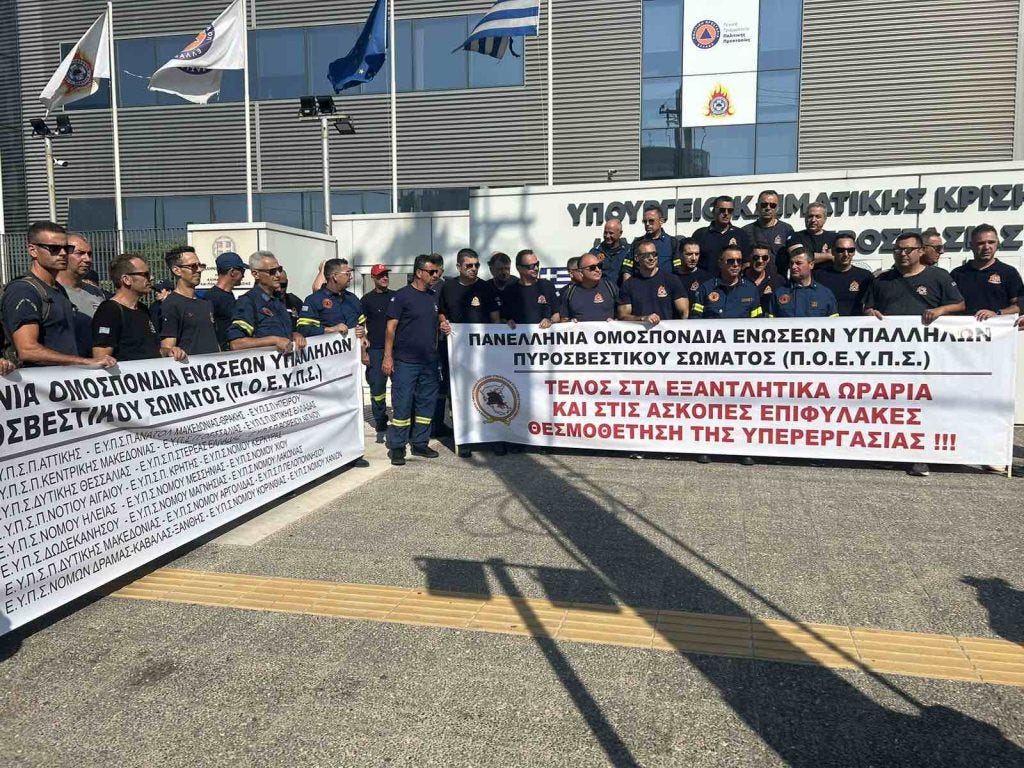Austerity and the Greek fires
Several EU countries continue to cut firefighters despite growing wildfires.
“We had a really beautiful mountain until the day before [yesterday], where you could be out at night and dream… I lost that… we lost that.”

These haunting words come from a volunteer named Elena who spoke to CNN while rescuing wild animals and pets in the aftermath of the fire that devastated the area near Athens earlier this month.
The fire started on the 11th of August when it erupted in the Attica region. The inferno moved like lightning, igniting the area into a hell-scape and pouring smoke into the skies. It was fed by strong winds and the hottest ever recorded summer in Greece’s history.
25,000 acres were burned, thousands of residents were evacuated, one person has died, and nearly 100 homes have been destroyed. It took the combined efforts of firefighters from several other EU member states including France, Serbia, and Romania to get the fire under control.
And yet, despite knowing that the intensity of Europe’s wildfires is growing due to climate change, why are countries across the EU slashing their numbers of firefighters?
Public services are always the first to go
I’ve seen almost no press from outside Greece mention that weeks before the fire, the national Greek firefighters union organized a protest on the streets of Athens warning of their inadequate resources, understaffing, and need for better working hours.

It was obvious to Greek firefighters that unless major changes were made, the situation was a recipe for disaster if a wildfire were to ignite.
In an interview with Greek journalist and film maker Daphne Tolis, she tells how the firefighters have been left without resources or sufficient staffing for years. Tolis tells the CBC interviewer that Greece is dependent on volunteer and seasonal and part-time firefighters because the state doesn’t provide sufficient resources to pay for enough full-time firefighters.
This situation dates back years and sometimes feels like a song stuck on repeat.
Back in 2018, after flames tore through Greece’s countryside in fires that left over 100 people dead, the Greek fire service was still reeling from the cuts imposed on it by the bailout package negotiated with the EU after the 2008/9 financial crisis.
A major part of the EU’s package at the time was force Greece to cut its public spending, especially within public services. After the 2018 fires, former Greek minister of Finance Yanis Varoufakis said that the country’s bushfire fighting unit was dismantled at the time to cut costs.
The EU tried denying that Greece cut its firefighting budget in response to pressure from the EU. A piece published by Investigate-Europe showed through Greece’s public budget data that Greece had in fact cut its firefighting budget significantly, likely as a result of the austerity measures imposed by the EU bailout deal.
When austerity is imposed and budgets need cutting, it’s the public sector that gets slashed and often society’s most vulnerable who suffer.
But that was years ago. Surely the EU’s political leadership has learned by now that austerity has deadly consequences… right?
Cutting firefighters during the climate crisis
Europe is the fastest warming continent and Southern Mediterranean countries are particularly impacted by drier summers and more intense wildfires. At the same time, report after report tells us that Europe is woefully unprepared for the consequences of climate change and needs to step up its investments rapidly to protect residents.
Unless the situation changes dramatically, heat related deaths could triple by the end of the century and research published in Nature warns that extreme forest fires could increase by tenfold if temperatures continue to rise.
Yet, reports from the European Trade Union Confederation and the European Public Service Union show that, despite growing wildfires, many EU countries have cut their numbers of firefighters. The data they provide shows a considerable reduction in firefighters in several countries between 2022 and 2023. Across the entire EU, firefighters increased by just over 3,000 between 2022 and 2023 although the total number had decreased between by over 5,000 firefighters between 2021 and 2022.
In Greece, there was a cut of over 2,500 firefighters last year, despite the likelihood of intense wildfires in the summer season.
Once again, the EU is pushing for cuts
The EU recently signed into law new fiscal rules that set firm rules on the budgets of EU member states. Already, the EU is pushing countries to make cuts and enter into excessive debt procedures despite relatively low levels of debts.
In a mind-boggingly sense of internal contradiction, the EU is repeatedly calling for ambition and spending on measures to mitigate the impacts of climate change while at the same time setting rules that block countries’ abilities to do so.
If we take a step back, we need to question whether the EU’s focus on reducing debts and deficits is warranted in the first place. Research indicates that the austerity measures imposed on Greece has been catastrophic for wages, unemployment, and especially public services. Economists have highlighted that rather than the lauded benefits of the austerity measures that were anticipated, the Eurozone crisis was extended and made more brutal by the policies that followed.
We know now that the brutal imposition of austerity led to a lost decade for much of Europe.
It’s going to take a massive public effort to prepare the EU to deal with the immediate effects of climate change, deindustrialization, and slowing productivity growth. Rather than cutting budgets and shorting staff, Europe’s firefighters need ambitious investment.
How much of Europe needs to burn before the political leadership learns its lesson?



